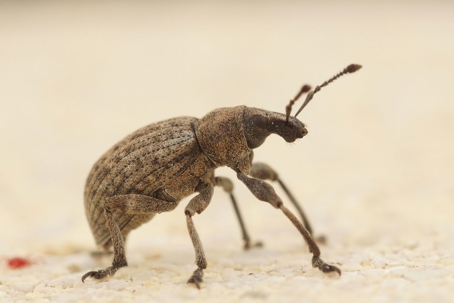Rice and granary weevils are common pests in stored grains, often causing significant damage and loss. Controlling these pests is essential for maintaining grain quality and preventing economic losses. Fuel is expensive! Groceries are expensive! Losing a bag of rice, cereal or flour to stored product pests adds insult to injury. What are rice weevils and granary weevils? What can I do once I notice this pest problem?
Description
Rice Weevils (Sitophilus oryzae):
- Appearance: Small, reddish-brown beetles about 2-3.5 mm long with four light yellow or red spots on their wing covers.
- Behavior: Capable of flying, they infest whole grains, particularly rice, wheat, corn, and other cereals. Female rice weevils lay eggs inside the grain kernels, where larvae develop, feeding on the grain and hollowing it out before emerging as adults.
Granary Weevils (Sitophilus granarius):
- Appearance: Similar in size to rice weevils, but uniformly reddish-brown to black and lacking the characteristic spots on their wing covers.
- Behavior: Unlike rice weevils, granary weevils cannot fly. They prefer cooler climates and infest stored grains such as wheat, barley, and corn. Females also lay eggs inside the kernels, leading to larval development within the grain.
Control Methods
Inspection and Monitoring: Regularly inspect stored grains for signs of infestation, such as damaged kernels and the presence of adult weevils. Use pheromone traps to monitor weevil activity and identify infestation hotspots.
Sanitation: Clean storage areas thoroughly to remove any spilled grains or food debris that could attract weevils. Ensure that storage containers and areas are free from cracks and crevices where weevils can hide.
Proper Storage: Store grains in airtight, pest-proof containers to prevent weevil entry. Use food-grade diatomaceous earth as a protective barrier, mixing it with stored grains to deter weevils.
Temperature Control: Weevils are sensitive to temperature extremes. Freezing infested grains at 0°F (-18°C) for at least four days can kill all stages of weevils. Alternatively, heating grains to 140°F (60°C) for 15 minutes can also be effective.
Chemical Control: If infestations are severe, consider using insecticides labeled for weevil control in stored grains. Always follow the manufacturer's instructions and safety guidelines when using chemical treatments.
By combining these methods, you can effectively control and prevent rice and granary weevil infestations, ensuring the quality and longevity of stored grains. When you call Anderson Pest Control you will be talking to skilled professionals. You pay for expertise not “bug spray.” Call today for free advice. Sign up for our year round protection plan for ALL your pest control needs.

